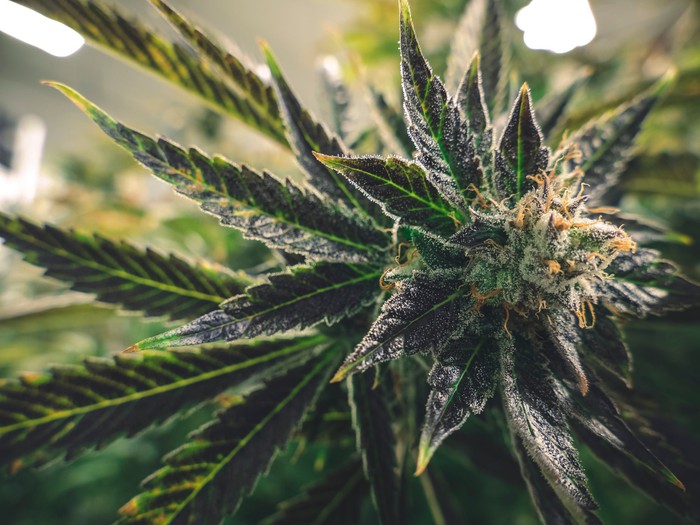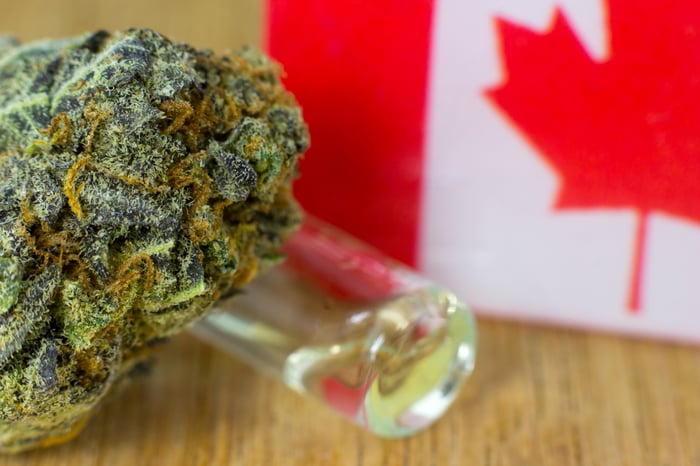You are here
Home 🌿 Regional 🌿 North America 🌿 Canada 🌿 Has marijuana stock Aurora Cannabis found a bottom? 🌿Has marijuana stock Aurora Cannabis found a bottom?

According to a newly released report from the Prohibition Partners, the legal weed industry could be generating as much as $103.9 billion in annual sales by 2024. That would represent a compound annual growth rate of nearly 46% between 2018 and 2024, making cannabis one of the fastest growing industries on the planet.
While there are an abundance of pot stocks for investors to choose from, it's Aurora Cannabis (NYSE:ACB) that often slots in near the top of the list. In fact, earlier this year it was learned that Aurora was the most-held stock on millennial-focused investment app Robinhood, above the likes of Apple and Amazon.com.
Here's how Aurora Cannabis became the most held stock
So, why Aurora and not say any of the other five dozen up-and-coming publicly traded cannabis stocks?
For one, Aurora's peak annual production should be unsurpassed, and that appears to be going a long way with investors. The company has 15 production facilities that have the potential to hit up to 700,000 kilos of annual aggregate output. At least 132,000 kilos of production will be derived from Europe, giving Aurora easy access to Europe's burgeoning medical marijuana industry.
To build on this point, Aurora's economies of scale should lead to some impressive yields. At Aurora Sun, a 1.62 million-square-foot grow farm in Alberta, Aurora is forecasting at least 230,000 kilos of annual output, when at full capacity. This works out to about 142 grams of yield per square foot. By comparison, most growers are estimating that their yields will range from 75 grams per square foot to 125 grams per square foot. This combination of growing efficiency and economies-of-scale is expected to help Aurora keep its production costs below the industry average (on a per-gram basis).
This is also a company with a significant overseas presence, as alluded above. Including Canada, Aurora has an export, production, research, or partnership-based presence in 25 countries. If and when dried flower becomes oversupplied and/or commoditized in Canada, the thinking is that these external markets will provide perfect sales channels to offload excess product and avoid an operating margin meltdown.
I'd even contend that Aurora's share price is psychologically attracting investors. Even though share price should have little bearing on investment potential, it's easy for investors to (wrongly) believe that a stock with a $3 share price can more easily double than a company with say a $30 share price.

Aurora Cannabis' stock has been clobbered for eight straight months
However, the rug has been pulled out from beneath Aurora and its shareholders since mid-March. Shares of the most popular pot stock have shed about 65% of their value, with Aurora pulling back from close to a $10 billion valuation to one that's now around $3.6 billion.
A number of factors have been at fault for this pullback, and they're mostly industrywide problems. For instance, Health Canada has been slow to work through a large backlog of cultivation, processing, and sales licenses, leading to exceptionally long wait times for growers to bring product to market.
Another concern has been the exceptionally slow rollout of physical dispensaries in select provinces. Ontario, for example, has a population of 14.5 million people, but only has two dozen open retail locations. That's only one retail store per 604,200 people, and it's made life very difficult for growers to get their product in front of customers.
The launch of cannabis derivatives has also been delayed by Health Canada. It was long believed that high-margin derivatives, such as edibles, vapes, and infused beverages, would find their way to retail store shelves no later than the one-year anniversary of recreational weed being legalized in Canada (Oct. 17, 2018). But Health Canada crushed those hopes midyear, noting instead that derivatives wouldn't find their way to dispensaries until mid-December. This means a longer wait for these high-margin products to have an impact.
Even marijuana pricing has been a sore point for Aurora Cannabis and its peers. Statistics Canada noted that black market pot was 45% cheaper than legal marijuana on a per-gram basis during the third quarter, which makes it virtually impossible for legal growers to compete with illicit producers.

Has Aurora Cannabis reached a bottom?
But the big question is: Has Aurora Cannabis now found a bottom in the mid-$3s?
On one hand, it's hard to see the company's income statement getting any worse from this point forward, which is a significant positive. Economies of scale should reduce its production costs on a per-gram basis, and Aurora's second-quarter report showed notable improvements on the adjusted EBITDA (earnings before interest, taxes, depreciation, and amortization) front. Though I still suspect Aurora will lose money in fiscal 2020 (ended June 30, 2020), it's very possible that an ongoing uptick in sales, coupled with a reduction in major capacity expansion expenses, may push its adjusted EBITDA positive on a recurring basis.
On the other hand, there are two factors that still have the potential to push its share price lower.
First, Aurora has $230 million Canadian in convertible debentures due in March. The convertible portion of these notes is nowhere near where the company's stock is currently trading, making it highly likely that Aurora will have to settle this debt by paying cash. It might do this by issuing another convertible note, or it could access a $750 million shelf offering that allows it to sell its own stock from time to time. Either way, Aurora's finances are a little shakier than investors probably realize, and that may not be fully factored into Aurora's share price.
Maybe the bigger issue for the company is its CA$3.17 billion in goodwill currently being lugged around on its balance sheet. This goodwill accounts for 58% of total assets and is a potential powder keg for Aurora. I just don't see how Aurora will recoup a significant portion of this value by building out its acquired assets, which should lead to a writedown. A sizable writedown could still clobber Aurora's stock, possibly sending it below $3 a share.
In my opinion, no, Aurora Cannabis has yet to hit a bottom.
420 Intel is Your Source for Marijuana News
420 Intel Canada is your leading news source for the Canadian cannabis industry. Get the latest updates on Canadian cannabis stocks and developments on how Canada continues to be a major player in the worldwide recreational and medical cannabis industry.
420 Intel Canada is the Canadian Industry news outlet that will keep you updated on how these Canadian developments in recreational and medical marijuana will impact the country and the world. Our commitment is to bring you the most important cannabis news stories from across Canada every day of the week.
Marijuana industry news is a constant endeavor with new developments each day. For marijuana news across the True North, 420 Intel Canada promises to bring you quality, Canadian, cannabis industry news.
You can get 420 Intel news delivered directly to your inbox by signing up for our daily marijuana news, ensuring you’re always kept up to date on the ever-changing cannabis industry. To stay even better informed about marijuana legalization news follow us on Twitter, Facebook and LinkedIn.




